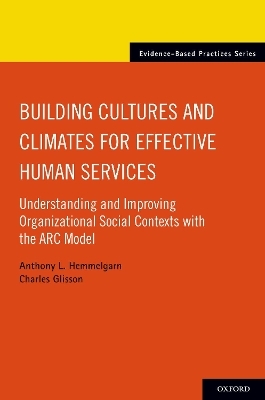
Building Cultures and Climates for Effective Human Services
Oxford University Press Inc (Verlag)
978-0-19-045528-6 (ISBN)
Anthony Hemmelgarn, PhD, is an industrial psychologist who has worked with researchers, organizational leaders, and practitioners nationwide to improve organizational cultures, climates, and effectiveness for over two decades. He is a primary co-developer and the lead implementation expert for ARC, an empirically-proven organizational development model that has improved organizational social contexts within human services across the nation, as well as client, staff, and organizational outcomes. He and his colleagues' publications in leading journals have helped shape research, organizational change theory, and organizational strategies to improve cultures and climates within human service organizations. He continues to promote and develop innovative approaches to optimize human services outcomes in healthcare and other human service organizations today. Charles Glisson, PhD, is currently Chancellor's Professor Emeritus at the University of Tennessee Knoxville and has directed research on human service organizations funded by the National Institutes for Health, W.T. Grant Foundation and other funders for over 40 years. He has authored over one hundred publications on human service organizations and is internationally known for his research on assessing and changing organizational social context to improve human services. He was awarded the NASW Lifetime Achievement Award in Health and Mental Health in 2014.
Chapter 1. Improving Organizational Social Contexts for Effective Human Services
Chapter 2. Case Examples Illustrating the Importance of Social Contexts in Human Service Organizations
Chapter 3. Understanding and Assessing Organizational Social Context (OSC)
Chapter 4. Introducing the Availability Responsiveness and Continuity (ARC) Organizational Strategies
Chapter 5. The Impact of ARC in Human Service Organizations
Chapter 6. ARC Infrastructure, Preparation, and Key Strategies for Creating Effective Human Service Organizations
Chapter 7. ARC Stages and Component Tools
Chapter 8. The Role of Mental Models in Organizational Change
Chapter 9. Mission-driven versus Rule-driven Human Service Organizations
Chapter 10. Results-oriented versus Process-oriented Human Service Organizations
Chapter 11. Improvement-directed versus Status Quo-directed Human Service Organizations
Chapter 12. Participatory-based versus Authority-based Human Service Organizations
Chapter 13. Relationship-centered versus Individual-centered Human Service Organizations
Chapter 14. Conclusion and Future Challenges for Improving Human Service Organizations
References
| Erscheinungsdatum | 11.09.2018 |
|---|---|
| Reihe/Serie | Evidence-Based Practices |
| Verlagsort | New York |
| Sprache | englisch |
| Maße | 231 x 155 mm |
| Gewicht | 358 g |
| Themenwelt | Sozialwissenschaften ► Pädagogik ► Sozialpädagogik |
| Sozialwissenschaften ► Soziologie | |
| ISBN-10 | 0-19-045528-4 / 0190455284 |
| ISBN-13 | 978-0-19-045528-6 / 9780190455286 |
| Zustand | Neuware |
| Haben Sie eine Frage zum Produkt? |
aus dem Bereich


